
You didn't really think we were done connecting sex to video games, did you?
This time we're focusing on something which is very close to our hearts over here at IWG. Also, and perhaps more importantly, we needed an excuse to put 'sexy cosplay' into Google Images just one more time...
(Possibly NSFW)
What is cosplay?
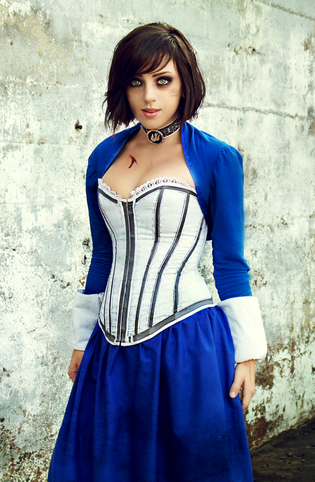 April Gloria as Elizabeth (Click for source)
April Gloria as Elizabeth (Click for source) The emergence of events and expos celebrating the gaming industry as a whole subculture has allowed some of the most determined and charismatic fans to go out and forge entire careers by crafting their own extremely-detailed costumes, appearing ‘in character’ at booths and stalls, and then taking pictures and signing autographs with their fans.
Initial success of a cosplayer is determined by the quality of a model’s costume, judged on several understandable factors. How loyal is the costume to the actual character? How appealing is the costume to the eye? Will people see this model wearing this costume and immediately want to engage with him/her? Will they want to buy and play the game which the ‘cosplayed’ character is originally from? As a marketing executive working tirelessly to promote a new video game product, how might I use the popularity of this cosplayer to my advantage?
Before you start thinking about it, let’s flip this around.
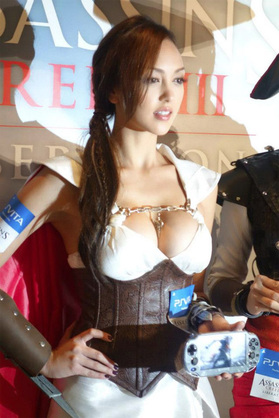 Jessica Cambensy promoting (Click for source)
Jessica Cambensy promoting (Click for source) There are a lot of people out there who have formed judgements on those who choose to lead a lifestyle centered on this very idea, but it’s not a shameful thing that should ever need defending. The most successful cosplayers are themselves entertainers who never spend too long in one place and are always travelling from convention to expo and vice-versa in order to either promote a product (and get paid) or meet their fans (and get paid). Popular cosplayers draw a crowd. I mean I don’t know about you guys, but I’d certainly be tempted if someone offered me that on a silver platter.
It’s also not as easy as it sounds either. Games promotion can often be an arduous process spent away from your family and friends (and cat) because you’re off at a convention in some foreign country on the other side of the world, trying to talk the lingo to a load of fans abroad and keeping the smile genuine. You’d get used to it, sure, and it would definitely have its advantages – but if you’re an introvert like me than you can see how dedicating your life to something of this magnitude would certainly be challenging. It would also mean you’d spend less time playing the very games you love.
Sexy Pikachu and Sexy Peach
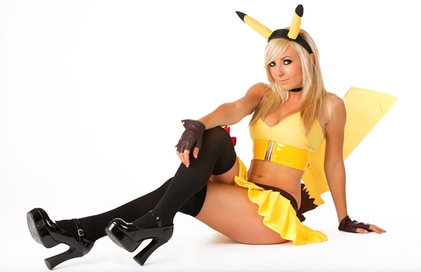 Jessica Nigri as Sexy Pikachu (Click for source)
Jessica Nigri as Sexy Pikachu (Click for source) For example, Jessica Nigri is a popular cosplay model/gamer who rose to fame after portraying a sexy interpretation of Pikachu back in 2009. The costume was made up of black heels with black stockings, a yellow miniskirt, a matching yellow bra (with a yellow belt just beneath, thus extending the bra into something less bare), as well as a couple of Pikachu-like ears and the iconic lightning sting tail. It was this very costume which caught the eyes of prominent marketing people, and Jessica was immediately ushered into a life of cosplay at various conventions and expos around the world, sometimes promoting new material for studios (as with her Edward Kenway costume last year).
Whilst there was no doubt that Nigri could not have known the effect her Pikachu costume would have and how much it would change things for her life in general, there can be no mistake that it was her unprecedented sexualisation of the character which triggered her launch into the limelight. Nigri has since gone onto become of one of the world's most recognised and celebrated cosplay models.
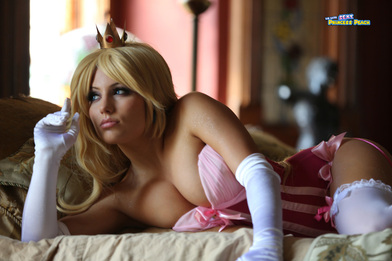 Liz Katz as Sexy Peach (Click for source)
Liz Katz as Sexy Peach (Click for source) Cosplay model Liz Katz did a photoshoot just last year where she was dressed up as a Sexy-fied Princess Peach, wearing a costume which was just essentially your run-of-the-mill seductive lingerie (a tight corset with prominent cleavage, frilly stockings beneath, etc) but coloured in bright shades of pink and violet. Now, whilst it was certainly sexy (and just look at her) just about the only things related to Princess Peach were the exaggerated blonde hairpiece, the tiny golden crown that accompanied it and perhaps the long-sleeved regal gloves (at a pinch), all of which have always been iconic to Peach’s image. Without those things it would have been quite hard to determine exactly what character Miss Katz was portraying from what franchise, had it not been signified on each of the published images. However, the photoshoot itself was the result of an Indiegogo campaign started by Miss Katz herself which, according to the official page, raised almost $5,000 by fans. The goal initially started at raising just $650, but was expanded into a larger project when fans broadened their investment. The rewards for donations were also expanded.
Cosplay is of course an art-form and therefore a form of personal expression channelled through clothing and character. But as a gamer I find it a little disconcerting that costumes such as this, or Nigri’s infamous version of Pikachu, might represent. I have no doubt that both models are gamers and genuine fans of the industry they work so tirelessly to promote, and how they express themselves through their costumes is their own damn business – but should there be a limit to how certain characters (such as Pikachu or Princess Peach) are interpreted?
In an effort to get to the bottom of this, we were directed by professional cosplayer Abby Dark-Star to a video of a Comic Con Panel dated from March of this year, which was themed on this very subject. Hosted by Keith ZenDragon, Abby is joined on the panel by fellow cosplayers Meagan Marie and Jojo Pandaface.
Is cosplay even a sexualised thing at all?
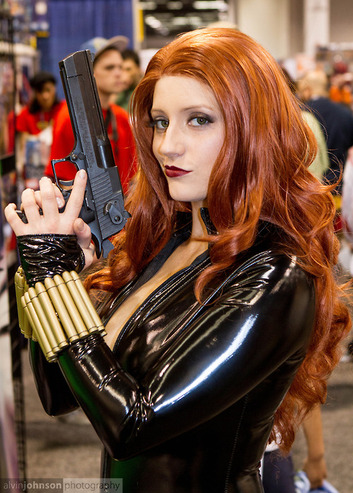 Abby Dark-Star as Black Widow. (Click for source)
Abby Dark-Star as Black Widow. (Click for source) On the panel, the subject of representation of sexuality through cosplay, and how certain costumes are perceived, is discussed at great length. It becomes very clear that viewing cosplay as a sexual thing is just one perception out of a whole pantheon. Skimpier costumes, whilst perhaps drawing more attention to certain areas of the body, are still just a form of personal expression and therefore a part of the art. This applies to all of the costumes you see in this article. In fact, it is suggested during the discussion that skimpier costumes might even be more difficult to put together as they are comprised of much smaller components which must, at all times, keep the overall costume and cosplayer thoroughly dignified.
Meagan Marie, whilst dressed as Daenerys Targaryen from Game of Thrones, explains that some people are more prone to judging a cosplay artist for designing and wearing perhaps a skimpier version of a famous character's costume. These judgements are often based on a love and passion for said character and, subsequently, stem from strong feels about how they would like this character ought to be portrayed. What the judgmental person (or party) fails to realise that the cosplayer to whom they are passing judgement on, in all likelihood, shares that same passion and love, and are merely expressing it in a way which suits their own personal preferences, paying tribute to the character and complimenting their own physique in the process. These carefully designed costumes, no matter the original character or their gender, are structured entirely to the preference of the artist. Developing a female costume based on a male's isn't an attempt to sexualise it or anything like that at all in fact, but is actually a way for the artist to personalise and make that character (whoever it might be) their own.
Abby Dark-Star, as Black Widow from The Avengers, iterates that there is a wide belief in the community that many cosplayers actually show up at conventions and expos in costume for financial gain when, in fact, it couldn't be further from the truth in most cases. She argues that most popular cosplayers actually hold down full-time jobs outside of their cosplay lives, and yet still invest a lot of time, physical labour and their own money into the development of their costumes, and all simply out of their love for it as a hobby. Keith, whilst dressed as himself, states that even cosplayers who do manage to make a living out of the art do so whilst paying rent (just like everyone else), but have the extra stress of relying on having a new cosplaying gig to go to immediately in order to keep their rent up. He goes on to say that women in general are challenged by the overly judgmental in many environments, and it is no different with regards to cosplay, but that all female cosplay artists should instead be accepted by the majority for simply doing what so many others do - which is expressing themselves through what it is that they are distinctly passionate about. Wearing a costume in any public place invites negativity as well as positivity, he continues. Everyone should give the cosplayer their personal space as they would anyone else, and maintain a strong level of respect at all times.
You've read both sides, but what do you think?

Do you think that there are certain costumes or characters which should not be portrayed in a sexualised way? Is 'sexualised' even the right term? Or is it all down to personal preference and interpretation of the artist?
Get in touch with us on Twitter or via our Facebook page and let us know your thoughts!
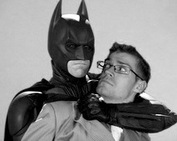
 RSS Feed
RSS Feed
